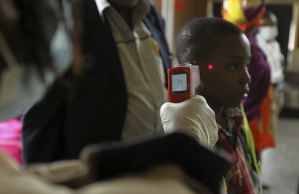
The United States government announced that it will step up health screenings on airline passengers from West Africa at five major airports in response to the Ebola crisis, which includes taking temperatures, looking for fever and filling out a questionnaire.
The stricter procedures, which will be enforced by Customs and Border Protection, will start on Saturday at John F. Kennedy Airport in New York City and begin next week at international airports in Newark, N.J., Washington, Chicago and Atlanta. According to White House spokesman Josh Ernest, those five airports receive 94 percent of travelers from West Africa and about 150 passengers a day from Ebola hot spots in Liberia, Sierra Leone and Guinea.
"This is almost by any measure a very small percentage of the traveling public who will be subject to these additional measures," Earnest said.
The Transportation department said that those five locations are among the country's busiest airports, which handled 130 million total passengers last year, 32 million of them international travelers.
Agents from Homeland Security have already begun observing travelers for potential signs of Ebola infection at airports and other U.S. entry points. Homeland Security Deputy Secretary Alejandro Mayorkas mentioned to the Associated Press that agents from Customs and Border Protection have been handing out information sheets to travelers containing details of what Ebola symptoms to look for and who to call if they get sick within 21 days, which is considered the incubation period for Ebola.
"You were given this card because you arrived to the United States from a country with Ebola," the information sheet states. "Take your temperature every morning and evening, and watch for symptoms of Ebola."
The strengthening of Ebola screens comes on news from an Associated Press article posted on ABC News that a Liberian man in the U.S. infected with Ebola has died. The first man diagnosed with the deadly disease, Thomas Eric Duncan, 42, went to Dallas in late September but initially did not have any symptoms related to Ebola when he entered the U.S.
According to an article posted in the Los Angeles Times, the new layer of screenings probably would not have detected Duncan's case. Officials have noted that Duncan's temperature readings were normal and had no symptoms until he arrived in Texas a few days later.
However, stopping Ebola at its source has successfully been done before. According to an article from National Public Radio, Firestone Tire and Rubber Co. managed to keep the deadly virus off its rubber plantation, located close to Liberia's capital, Monrovia, by placing an employee's wife and family into quarantine.
"Unfortunately, at that time, there was no facility that could accommodate her," said Ed Garcia, the managing director of Firestone Liberia. "So we quickly realized that we had to handle the situation ourselves."
Even though the woman soon died from Ebola, no one else at Firestone's rubber plantation, including her family and the workers who surrounded and treated her, became infected with the deadly virus for several months. NPR has noted that Firestone's efforts have been hailed as resourceful, innovative and effective by the Centers for Disease Control and Prevention.







